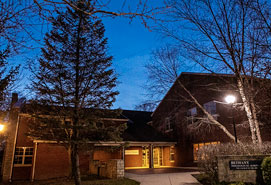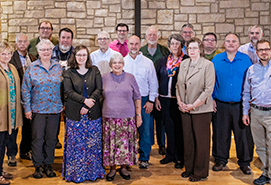New Master’s Degree Highlights Revised Curriculum

In fall 2019 Bethany Theological Seminary will offer its first new graduate degree in fifty years—the master of arts: theopoetics and writing (MATW). This degree is a major feature of the comprehensive curriculum revision that Bethany faculty have undertaken during the past eighteen months.
Taking advantage of growing interest in theopoetics, the MATW is distinctive in more ways than one. It is the only degree available in theopoetics, a field that approaches God and spirituality through aesthetics—most notably, language—and characterizes mysteries of the divine as part of everyday lived experience. In 2016 Bethany launched the graduate Certificate in Theopoetics and Theological Imagination, also the first of its kind.
The MATW also represents a unique collaboration with the well-recognized and respected Ministry of Writing program at Earlham School of Religion, building on strengths of both schools. The degree was developed jointly by Scott Holland, Slabaugh Professor of Theology and Culture at Bethany, and Ben Brazil, assistant professor and director of the Ministry of Writing program at ESR. The degree requires courses taught at both schools but is offered independently by each.
Holland, a nationally known scholar and lecturer on theopoetics, teaches the first course in theopoetics ever offered and is the primary professor for Bethany’s certificate. He notes that while some students have folded their certificate study into the Seminary’s existing programs, “we were also attracting students drawn to theopoetics and writing who had no interest in a traditional seminary degree. They began asking for an MA that allowed them to concentrate on theopoetics.”
Brazil’s journalism career, including publication in The New York Times, The Washington Post, and The Los Angeles Times, has taken him around the world, while his doctoral work focused on the intersection of contemporary spirituality and travel. “For years, students have told me that my classes dovetail perfectly with Scott’s. I teach the craft of writing, and Scott helps students understand why creativity and faith belong together. This collaboration puts ESR and Bethany on the cutting edge of a growing field.”
Bethany’s newly revised master of divinity was launched in fall 2018, and the revised master of arts will be offered in fall 2019. For both, four new program objectives focus on process and outcome, helping students gain knowledge and develop skills for their desired vocations: (1) Interpreting scripture, tradition, and theology; (2) communicating with contextual awareness; (3) integrating learning across one’s program; and (4) demonstrating knowledge and expertise.
In keeping with today’s students’ educational needs and desires and rising student debt—as many seminaries are doing—the required credit hours have been reduced to 72 for the MDiv and 42 for the MA. More course formats now count toward the residency requirement for the MDiv, and the residency requirement has been dropped for the MA. While courses continue to be required in the traditional content areas of Bible, history, ministry, and theology, “degree requirements can be fulfilled with a greater variety of courses, allowing students more choice in their educational programs,” says Steve Schweitzer, academic dean.
Bethany has also added two new graduate certificates for a total of six. The Certificate in Theology and Science was launched this academic year, and the Certificate in Biblical Peacemaking will be offered in fall 2019. The latter was specifically addresses the interests of Nigerian students who take courses through Bethany’s educational partnership with EYN; however, all qualifying courses for the certificate are part of Bethany’s existing programs, encouraging intercultural connections in Bethany classrooms. All graduate certificates at Bethany require just five or six courses and can be completed in one to two years.








 Green Circle: Bethany invests in 100% renewable energy.
Green Circle: Bethany invests in 100% renewable energy.